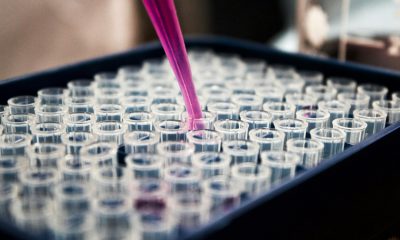Biotech
Spanish biotech companies contribute 0.7% to the GDP and generate more than €8.2 billion in income
The turnover of the Spanish biotech sector in 2018 exceeded $11.7 billion (€9.8 billion), with a year-on-year growth of nearly 6% and very similar to that recorded in the previous year. The Annual Report of the Spanish Association of Biocompanies (AseBio) showed that the biotech sector generated about 0.7% of the Gross Domestic Product in 2019.

The activities of biotech companies have a significant impact on Spain’s GDP. In fact, the Annual Biotechnology Report 2019 of the Spanish Association of Biocompanies (AseBio), indicated that they have generated more than $9.77 billion (€8.2 billion) in income, around 0.7% of the national total, which comes mostly from indirect effects.
With regard to the impact of the collection, the document highlighted that biotech companies contribute 0.3% of the GDP in the collection. In this way, investments in science and innovation generate important income flows to the State that allow Spain to protect its social welfare model. In 2018 alone, the impact on the tax revenue of biotech companies amounted to some $4.3 billion (€3.6 billion), which is around 0.3% of the GDP.
If you want to find why the biotech sector in Spain has a significant impact on the country’s GDP and on the employment rate, download our companion app. The Born2Invest mobile app is the best online news aggregator and it is available for free, for both Android and iOS devices. Bor2Invest brings you the latest economic news in the world so you can stay on top of the market.
Biotech’s turnover in 2018 exceeded $11.7 billion (€9.8 billion), with a year-on-year growth of nearly 6%
The turnover of the biotech sector in 2018 exceeded $11.7 billion (€9.8 billion), with a year-on-year growth of nearly 6% and very similar to that recorded in the previous year. In the report, it is explained that, in order to generate this turnover, biotech companies needed to acquire intermediate consumption valued at more than $8.6 billion (€7.2 billion), which would have generated a little over $3.1 billion (€2.6 billion) in income (GDP). On the other hand, 68% of this was used to pay the more than 27,000 workers directly employed by the biotech companies.
In this sense, the impact on employment of the activities carried out by biotech companies stands out, which is amplified throughout the production chain. Thus, for each direct job, almost three other indirect and induced jobs are generated. According to the AseBio report, these companies would be responsible for maintaining just over 105,000 jobs, which represents 0.6% of total national employment.
6.7% of the total number of jobs depend on the biotech sector
If this analysis is extended to all the companies that carry out biotechnological activities, the total volume of employment that depends, directly or indirectly, on the activities developed by these companies would exceed 1,195,000 jobs. That is, 6.7% of the national total.
Another point in favor of the biotechnology sector is its growth in production. In 2018, biotechnology activities were at the top of production growth among all activities of the economy.
To calculate this, the authors of the report estimated the evolution of the turnover of biotech companies, together with the data provided by the INE for companies with secondary dedication, and those that use biotechnology as a production tool. The growth of production in the biotechnology sector is only exceeded by the extractive industries. Likewise, the companies that have biotechnology as a secondary activity are the ones that have shown themselves to be the most dynamic.
As another report from Asebio indicated, in 2019 private capital and venture capital increases were consolidated as the main financing instruments. Throughout the year, the amount committed and disbursed by venture capital management entities that invest in Spanish biotechnology companies increased, with more than $88.6 million (€74 million).
__
(Featured image by Alex Azabache via Pexels)
DISCLAIMER: This article was written by a third party contributor and does not reflect the opinion of Born2Invest, its management, staff or its associates. Please review our disclaimer for more information.
This article may include forward-looking statements. These forward-looking statements generally are identified by the words “believe,” “project,” “estimate,” “become,” “plan,” “will,” and similar expressions. These forward-looking statements involve known and unknown risks as well as uncertainties, including those discussed in the following cautionary statements and elsewhere in this article and on this site. Although the Company may believe that its expectations are based on reasonable assumptions, the actual results that the Company may achieve may differ materially from any forward-looking statements, which reflect the opinions of the management of the Company only as of the date hereof. Additionally, please make sure to read these important disclosures.
First published in iSanidad, a third-party contributor translated and adapted the article from the original. In case of discrepancy, the original will prevail.
Although we made reasonable efforts to provide accurate translations, some parts may be incorrect. Born2Invest assumes no responsibility for errors, omissions or ambiguities in the translations provided on this website. Any person or entity relying on translated content does so at their own risk. Born2Invest is not responsible for losses caused by such reliance on the accuracy or reliability of translated information. If you wish to report an error or inaccuracy in the translation, we encourage you to contact us.

-

 Crypto2 weeks ago
Crypto2 weeks agoIntesa Sanpaolo Signals Institutional Shift With Major Bitcoin ETF Investments
-

 Cannabis3 hours ago
Cannabis3 hours agoBrewDog Sale Leaves Thousands of Crowdfunding Investors Empty-Handed
-

 Markets1 week ago
Markets1 week agoRice Market Slips as Global Price Pressure and Production Concerns Grow
-

 Biotech4 days ago
Biotech4 days agoInterministerial Commission on Drug Prices Approves New Drugs and Expanded Treatment Funding
























